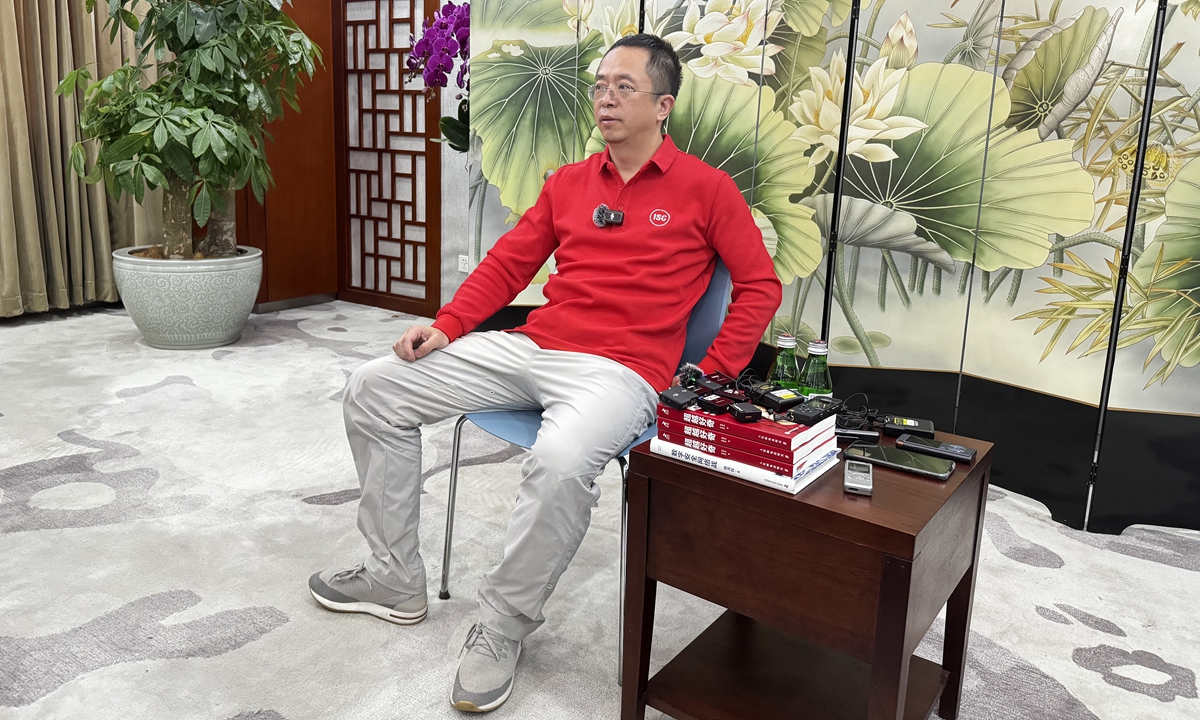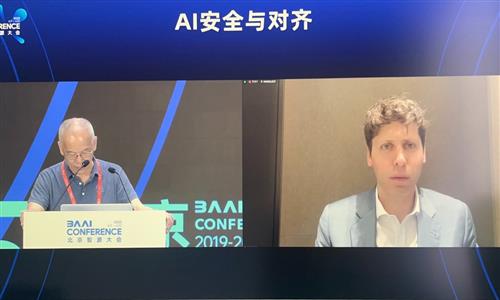Chinese firms can narrow AI gap with US within 1 or 2 years: founder of cybersecurity company

Zhou Hongyi, founder and chairman of 360 Security Technology and a national political advisor, talks to reporters on February 23, 2024. Photo: Liu Caiyu/GT
The main difference between China and the US in artificial intelligence (AI) lies in "determining the technical direction," but once the direction is determined, with China's strong advantage in its rapid learning capabilities, the gap will be narrowed within one or two years, said Zhou Hongyi, founder and chairman of 360 Security Technology who is also a member of the National Committee of the Chinese People's Political Consultative Conference to the upcoming two sessions.
2024 may become the "year of application" for China in the field of AI, Zhou told the Global Times on Friday, reaffirming his confidence in China's development in the realm of AI, believing that large models will have great potential in many vertical areas across the economy this year.
"It may be difficult for China to create a universal large model, which surpasses GPT-4 for now, but it is entirely possible to surpass GPT-4 in some vertical fields," Zhou said.
Last week, OpenAI released Sora, a text-to-video AI generator, which can create realistic videos based on user text prompts, sparking global attention and discussion. Zhou said on the following day that OpenAI likely still has some unleashed secret weapons, suggesting that there are still gap between China and the US in this regard.
"I believe there is a gap between China and the US, and I have always insisted on saying so. Only by recognizing the gap can we know how to catch up. If you don't admit there is a gap and think we are all far ahead every day, then it won't work," Zhou told the Global Times on Friday.
He believes that the main gap between China and the US in AI lies in the "original direction" for AI technology, referring to transformers, a deep-learning architecture that OpenAI is based on. Transformers are a type of neural network architecture that learns context and meaning by tracking relationships in sequential data.
Zhou explained that when the Japanese dominated electric cars, they chose a hydrogen architecture, Toyota went with a hybrid architecture, and Tesla went with a pure electric battery architecture. Through continuous development, BYD now has the opportunity to surpass Tesla in sales, he said.
Through these examples, Zhou emphasized that the main gap between China and others lies in the sense of direction. Considering that transformer architecture, Sora, and the like are fundamentally software, this kind of gap can be bridged within one to two years, Zhou noted.
"Once the direction is determined, Chinese companies' learning capabilities are very fast. Especially when peers release open-source projects or publish papers publicly, it is not a difficult problem for Chinese teams to follow up."
When discussing the impact and prospects of Sora, Zhou mentioned that what impressed him the most about Sora is that those generating videos are just a "by-product." In the process, Sora needs to learn a lot of video material, not just how to draw patterns, but more importantly, it must understand the interactive relationships among many elements in the real world.
"Some argue with me that drawing software can also depict a dog in the snow, but the issue is, depicting a static dog and snow doesn't require understanding common sense; you just need to draw according to the image. However, to show a dog frolicking in the snow, with snow falling softly, requires learning and accumulation of real-world common sense," he explained.
He also indicated that in the end, technological competition boils down to talent density and profound accumulation. AI may not necessarily disrupt all industries quickly, but it can stimulate creativity in more people.
"Sora brings us a step closer to AGI (Artificial General Intelligence)," Zhou told the Global Times.
GPT actually solves the problem of mutual understanding and interaction between machines and humans, which is overcoming the first major hurdle. However, it doesn't know many of the rules of this world; for example, training a robot to fetch tomatoes from the fridge and then fry eggs would be difficult because it needs to know that tomatoes don't break when dropped, whereas eggs do, he explained.
"It also needs to know how to crack eggs, something it must have seen like a human. I think this might be unintentionally achieved by OpenAI in developing Sora. Through this training method, machines can interact with the world," Zhou said.
This implies that Sora may be applied in the future in robotics and autonomous driving fields, as it has developed a perception of interaction with the real world.
Discussing the prospects of China's AI development in 2024, Zhou said that 2024 should be the "year of application" for Chinese AI, believing that large models will have great potential in many vertical fields of enterprises this year. "Large models should trigger an industrial revolution in the future, accompanying enterprises into various industries and integrating with many business processes and product functionalities."
Creating a universal large model that surpasses GPT-4 may be challenging at the moment, but GPT-4 currently "knows everything, yet not specialized." If we can excel in a particular business domain by training a large model with unique business data and integrating it with many business tools within that vertical, such a large model will not only have intelligence but also possess unique knowledge, even hands and feet, he said. "It is entirely possible for China to surpass GPT-4 in some vertical domains."
Some argue that the development of large models in China requires significant effort in content security and regulation. But Zhou believes that large models worldwide face security challenges, especially when it comes to ensuring their trustworthiness, controllability and reliability.
"Large models can either assist good people or become accomplices to bad people. For example, in the past, you had to know programming to conduct cyberattacks, but now you can converse with a large model by tipping it and it can diligently assist you, even colluding with you," he said.
Videos generated by Sora can be used to interfere in US elections, become a weapon affecting national security, or could even be used for fraud, presenting significant dangers. As AI technology has advanced beyond legal frameworks, the world is considering how to effectively regulate AI and prevent it from being misused or exploited, which is currently a global challenge, Zhou noted.
"I don't think regulation hinders the progress of AI. On the contrary, without any regulation, various AI tools developed by major internet companies may not be utilized by good people," he said.
Zhou indicated that reasonable regulation should have a positive impact on the development of AI, rather than being perceived as a hindrance.



